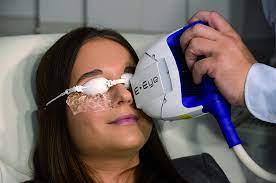When should you worry about floaters is a common question.
Eye floaters are little bits of debris that float around in the vitreous humor, a clear liquid which fills the space between the lens and the retina. Sometimes, however, there may be actual threads or spots that seem to float around in your vision. If you find these distressing and bothersome, you should see your optometrist or ophthalmologist to have them checked out.
Many people see little or no eye floaters and are not bothered by them. Those that do experience a lot of floaters might become concerned about them or want to discuss the matter with their eye doctor. Another reason for seeing your eye doctor is if you notice sudden appearance of new floaters or if you suddenly notice a significant increase in number and/or intensity of your floaters.
There are times when eye floaters may be normal for a person, but if they’re severe and start to interfere with your vision or make you feel generally uncomfortable, then it’s time to see an eye doctor. Eye floaters are sometimes caused by retinal tears or detachments, so if you have these symptoms or have had them in the past, seek immediate medical attention.
Eye floaters are circles, strings, or cobwebs that float across your field of vision. They’re usually harmless, but can be a sign of a serious problem.
There are a variety of reasons why you may notice floaters, including aging and macular degeneration. The most severe symptoms of eye floaters indicate internal eye problems such as bleeding in the retina or retina detachments.
Sight is one of our most important senses and when it starts to decline, it can be a big problem. Eye floaters can lead to a lot of problems with your vision, including halos and glare, color distortion, headaches and other symptoms. But there are ways to manage eye floaters while they’re still at a manageable level.
If you start to experience eye floaters, especially more commonly with age, it is important to consult your Optometrist.
You may require a dilated examination which will mean you cannot drive for up to 6 hours after your appointment. So bring someone with you or come by public transport. The nearest trains stations are Syon Lane and Brentford rail stations.



